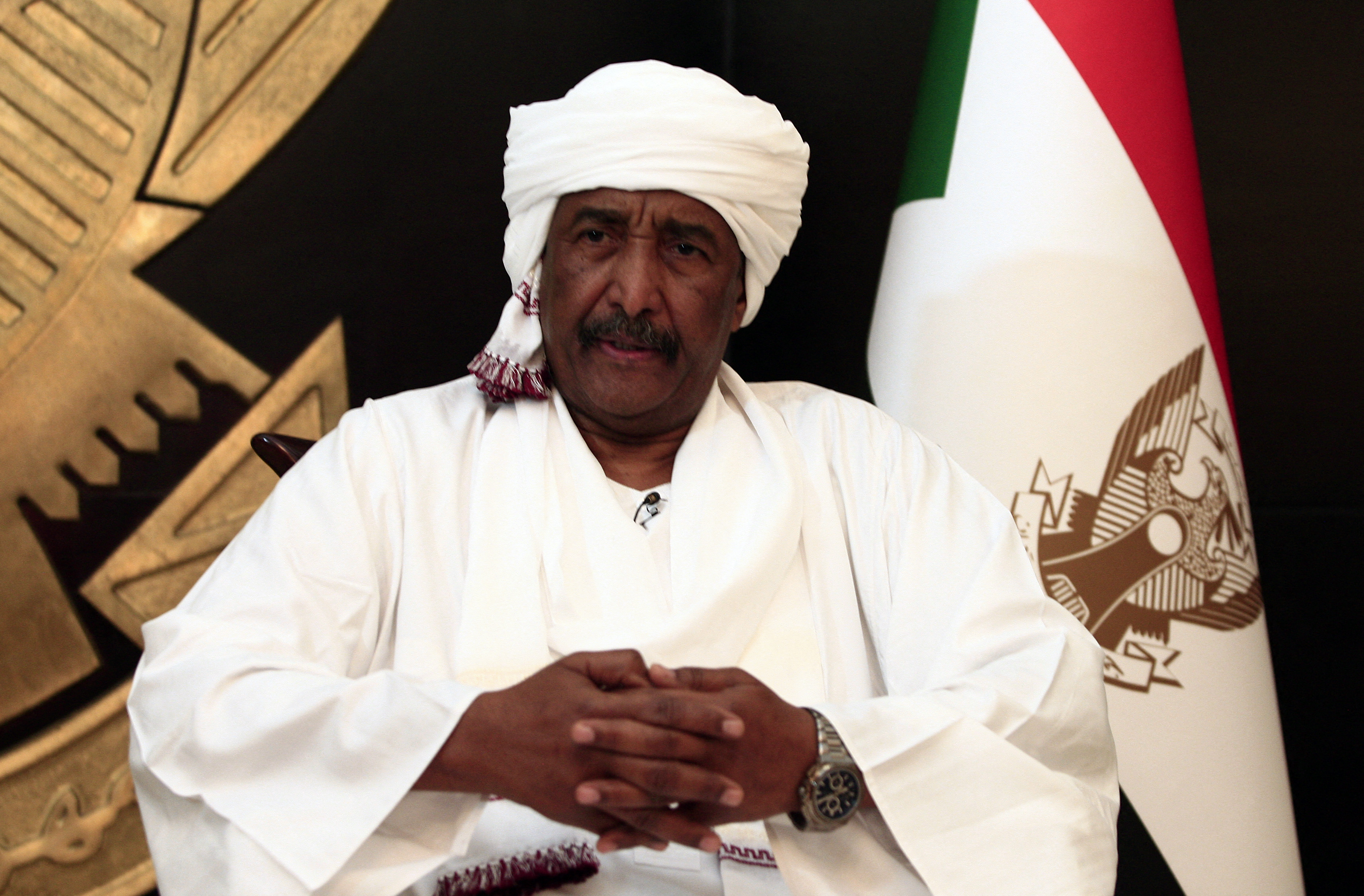
Sudan’s military ruler General Abdel Fattah al-Burhan has said the talks taking place in Saudi Arabia with the paramilitary Rapid Support Forces (RSF) will have no benefit without a ceasefire.
Al-Burhan’s remarks on Monday come as warring factions hold talks in Jeddah in a bid to end bloodshed that has killed hundreds and triggered a mass exodus.
The United States-backed talks began on Saturday between the army and the rival paramilitary RSF. No progress has been reported so far on the talks, which have focused on the possibility of introducing a lasting ceasefire.
“We can discuss a settlement after we reach a permanent ceasefire in Khartoum,” al-Burhan said in a live phone interview with AlQahera News, warning that war would spread to the rest of Sudan if a division happens in the capital Khartoum.
“The situation is stable in all states except for Khartoum,” al-Burhan was quoted as saying in Egyptian local media outlets.
To avoid being targeted by military forces, he added that members of the “brutal and oppressive” RSF are “seeking shelter in civilian homes and in service centres”.
A Saudi diplomat, speaking on condition of anonymity, told AFP news agency that the discussions have yielded “no major progress”.
“A permanent ceasefire isn’t on the table … both sides believe they are capable of winning the battle,” the diplomat added.
The combatants have previously said they would try to tackle only a ceasefire and humanitarian issues like safe passage. Numerous ceasefires have been violated since the conflict erupted on April 15.
Earlier on Monday, al-Burhan said the army was seeking a peaceful solution but that there could be discussions about a lasting settlement only “after we reach a permanent ceasefire in Khartoum”, where some of the fighting is centred.
“We believe the peaceful solution is the ideal route to handle this crisis,” he said.
But the sound of air strikes and clashes echoed anew across Khartoum on Monday, witnesses said, and neither side has publicly signalled it is open to concessions.
Al Jazeera’s Hiba Morgan, reporting from Khartoum, said there has been intense fighting between the RSF and the Sudanese army.
“There were heavy air strikes launched by Sudanese army fighter jets … around the vicinity of the presidential palace and in the central part of Khartoum,” Morgan said.
“Throughout the day we could see smoke rising from around that area as well as in east Nile where residents say air strikes were also launched by Sudanese army fighter jets.”
In the city of Khartoum North, there were also reports of artillery shelling, she said. Residents who were there say it is likely the “surface-to-air missiles that are being fired by the RSF against the Sudanese army fighter jets”.
Meanwhile, doctors say the situation in hospitals around Khartoum is very dire, according to Morgan, who added that they are running out of medicine, have a shortage of staff, and are in desperate need of assistance.
Mahjoub Salah, a 28-year-old doctor, witnessed heavy fighting and a neighbour getting shot in the abdomen in his central Khartoum district of Al Amarat last month, before renting a flat for his family in the south of the capital.
“We’re still waiting for our passports to get issued, but we don’t know how long this will take,” Salah said. “Then our plan is to travel from Port Sudan to Saudi Arabia.”
Absence of ‘key stakeholders’
The US-Saudi initiative is the first serious attempt to end fighting that has turned parts of Khartoum into war zones, stymied an internationally backed plan to usher in civilian rule after years of unrest, and touched off a humanitarian crisis.
The Saudi Foreign Ministry said “pre-negotiation” talks were “in the expectation of reaching an effective short-term ceasefire to facilitate humanitarian assistance”.
The US Department of State said it believed the sides had also discussed protecting civilians. Talks on any more permanent settlement appear far off.
“We are not for negotiation right now with [RSF chief] General Hemedti,” Dafallah Alhaj, an envoy to the army chief al-Burhan, said in South Sudan on Monday.
However, analysts have advised caution on the outcome, noting the presence of hardliners in the delegations and recent RSF territorial gains that may dissuade the powerful militia from concessions now.
“Key domestic and international stakeholders are not there like Egypt and the UAE, who are the only ones so far who have proven that they can guarantee a ceasefire,” said Kholood Khair, director of Confluence Advisory, a Sudanese think-tank.
“That no civilians are present recreates failings of previous political negotiations,” she said, adding that African states that support civilian rule in Sudan were also not present.
Thousands of people are seeking to leave from Port Sudan on boats to Saudi Arabia, paying for expensive commercial flights via Sudan’s only working airport, or using evacuation flights.
Since the fighting erupted, the UN refugee agency has registered more than 30,000 people crossing into South Sudan, more than 90 percent of them South Sudanese. The true number is likely much higher, it says.
Aid agencies fear the influx will worsen an already dire humanitarian crisis in South Sudan, which won independence from Khartoum in 2011 after decades of civil war.







